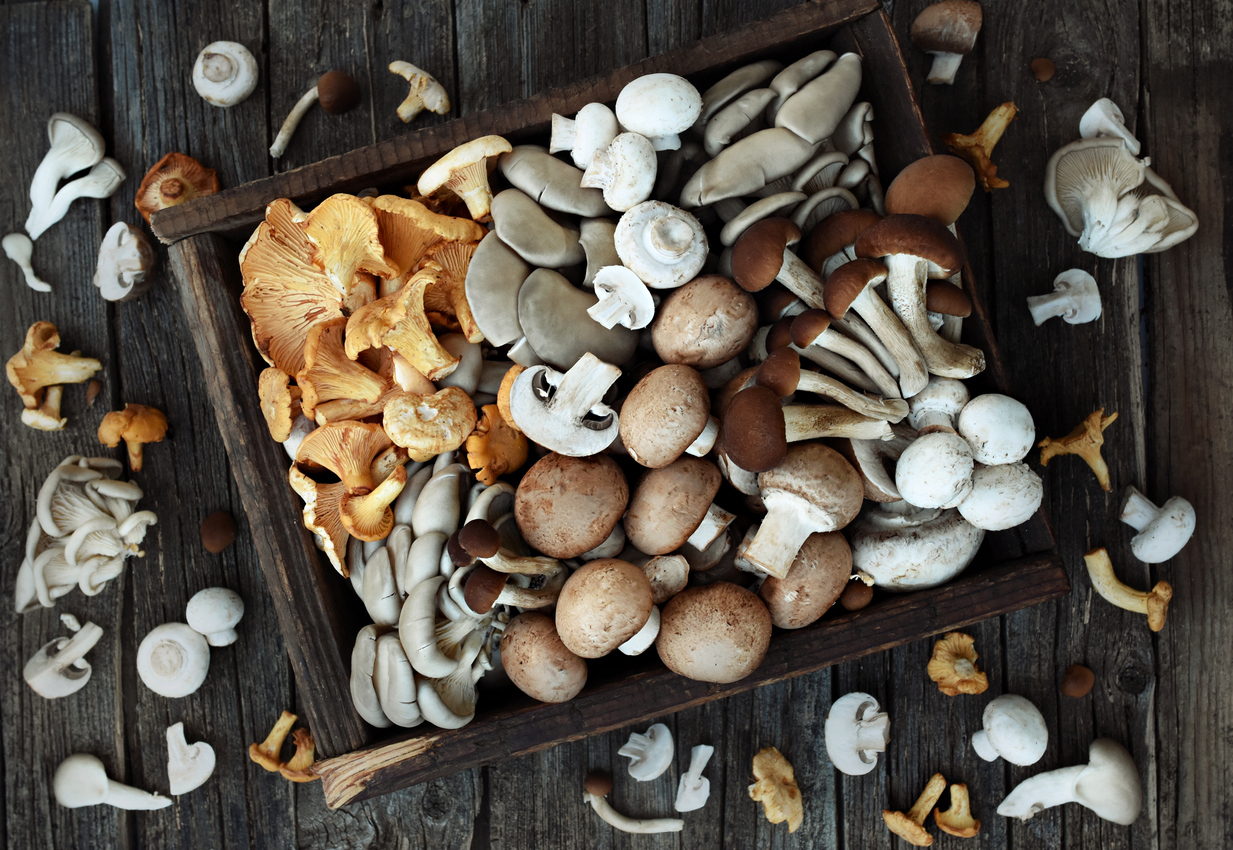Does the research into mushrooms back up the hype? Dr Linia Patel (PhD), RD weighs up the research into mushrooms and discusses why mushrooms deserve a spot on your plate.
As a dietitian, one food that always makes an appearance in my food shop is mushrooms. The belief that mushrooms have medicinal powers is nothing new. Mushrooms have been consumed for thousands of years for both nutritional and medicinal purposes, particularly in traditional Chinese medicine. Mushrooms are undoubtedly a good addition to a healthy and varied diet; however, recently, mushrooms have entered the market in their droves. We now have all sorts of mushroom products, from supplements and powders to mushroom coffees.
What’s in a mushroom?
There are over 2,000 edible varieties of mushrooms, each with a distinct nutritional profile influenced by its species and growing conditions. Despite their diversity, mushrooms share several common features that make them a valuable addition to any diet.
For instance, mushrooms provide a plant-based source of protein containing all nine essential amino acids. However, they are slightly lower in lysine, which makes it beneficial to pair them with lysine-rich foods, such as legumes or grains like quinoa, to ensure a complete protein intake. Additionally, mushrooms are rich in essential vitamins and minerals, including B vitamins, selenium, copper and potassium. Some species even synthesise vitamin D when exposed to sunlight. They are also an excellent source of fibre and bioactive compounds such as beta-glucans, L-ergothioneine, glutathione, terpenoids, alkaloids, and phenolic acids, contributing to their health-promoting properties. More on this later.
Within the vast mushroom family, a group known as ‘functional mushrooms’ has garnered significant research interest due to their edible and medicinal properties. These include varieties such as lion’s mane, turkey tail, shiitake, reishi and cordyceps, each known for their unique therapeutic potential.
Top health benefits of mushrooms
Each of the bioactive compounds found in mushrooms has demonstrated significant anti-inflammatory and antioxidant properties. For instance, beta-glucans, a type of soluble fibre, have been shown to modulate the immune system, lower blood glucose levels and reduce blood lipid concentrations, contributing to overall metabolic health. Ergothioneine (ET), an antioxidant that our bodies cannot produce, is uniquely transported to areas in need of repair via a specialised transport system we have evolved to have. It is believed to offer both antioxidant and anti-inflammatory effects, helping to protect tissues from damage.
In addition, compounds such as terpenoids, alkaloids and phenolic acids are thought to further support immune health, combat inflammation and protect against oxidative stress. These bioactive compounds may work synergistically to promote cardiovascular health, enhance gut function, strengthen the immune system and potentially aid in the management of neurodegenerative conditions.
Together, they offer broad-ranging benefits that could play a crucial role in maintaining overall health and preventing chronic diseases.
What does the science say?
Several comprehensive reviews have explored the potential therapeutic applications of mushrooms, yielding promising results. However, many studies included in these reviews were conducted in vitro (cell cultures) or in rodent models, often using isolated compounds derived from mushrooms at doses significantly higher than what one could realistically obtain from consuming a daily serving of mushrooms. It’s important to consider this context, as the claims surrounding the benefits of mushrooms may not be fully generalisable to humans based on typical dietary intake.
While some human studies have been conducted, the quality of evidence remains low. For instance, a randomised controlled trial involving 60 participants who added a daily serving of mushrooms to a Mediterranean diet found no significant improvement in cardiometabolic risk factors. However, the study did observe an increase in plasma levels of L-ergothioneine, an antioxidant found in mushrooms. This doesn’t negate the potential benefits of mushrooms, but it highlights the limitations of current research. Moving forward, more rigorous, well-controlled human studies are needed to better understand the true impact of mushrooms on health.
Take-home message
If you don’t have an allergy to mushrooms, upping your overall mushroom intake is a good choice. They are certainly healthy, even if we need to pause before we take all the claims we see as fact. Fresh and dried mushrooms should also be the first choice over powders and supplements. Should you want to dabble with the supplements, I recommend you work with a dietitian or a registered nutritionist for bespoke advice that is tailored to your goals and needs.
Dive in deeper to understand adaptogens, some of which are mushrooms in this FitPro blog.
References
- Venturella G et al (2021), Medicinal mushrooms: Bioactive compounds, use and clinical trials, In J Mol Sci., 10, 22(2): 634.
- Money N (2016), Are mushrooms medicinal?, Fungal Biology, 120(4): 449-453.
- Zhao O et al (2023), The benefits of edible mushroom polysaccharides for health and their influence on gut microbiota: a review, Front Nutr., 10: 1213010.
- Ontawong et al (2024), A randomised controlled clinical trial examining the effect of Cordyceps militaris beverage on the immune response in healthy adults, Sci Rep, 5.
- Uffelman C (2023), An assessment of mushroom consumption on cardiometabolic disease risk factors and morbidities in human: a systematic review, Nutrients, 15(5): 1,079.
- Djibril M et al (2021), Prospective study of dietary mushroom intake and risk of mortality: results from continuous National Health and Nutrition Examination Survey (NHANES): 2003 – 2014 and a meta-analysis, Nutr J., 20(1): 80.
- Halliwell B et al (2016), Ergothioneine, an adaptive antioxidant for the protection of injured tissues? A hypothesis, Biochemical and Biophysical Research Communications, 470(2): 245-350.








